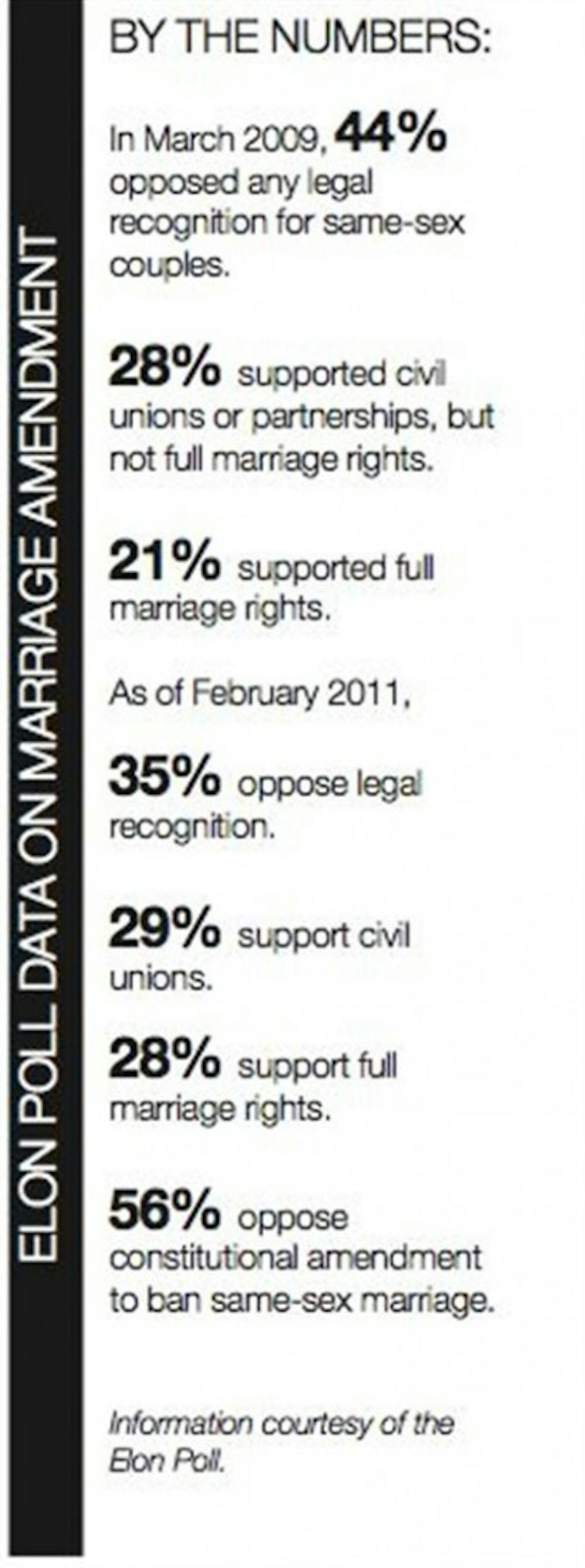 When it comes to marriage equality in North Carolina, the polls seem to show the state is confused. Elon Poll results from February indicated the population was split almost down the middle on whether to vote on a constitutional amendment to ban same-sex marriage. Only 28 percent of respondents said they supported full marriage rights for gay couples.
When it comes to marriage equality in North Carolina, the polls seem to show the state is confused. Elon Poll results from February indicated the population was split almost down the middle on whether to vote on a constitutional amendment to ban same-sex marriage. Only 28 percent of respondents said they supported full marriage rights for gay couples.
But senators in the North Carolina state legislature insist they are doing what North Carolina citizens want by giving the state an opportunity to vote on whether the state constitution should include an amendment to define marriage as a union between one man and one woman.
Same-sex marriage is already illegal in North Carolina but a constitutional amendment would make the existing law nearly impossible to overturn.
It would also likely deal a harsh blow to the state economy.
The United States' economy currently relies much more on the creation of ideas, such as inventions, than the manufacturing of goods, said Tom Tiemann, professor of economics at Elon University. More open-minded people tend to be better at idea-sharing, a coveted trait in hiring new employees, and the best idea-sharers tend to gravitate toward areas that are also more tolerant and accepting of differences, such as gay rights.
"Ideas come from people bouncing into each other," Tiemann said. "Firms that do that are pretty sure they'll find it harder to attract new people (if the amendment is passed). North Carolina does better than Virginia or South Carolina because it has changed faster than other parts of the south. There's a less entrenched political – social structure."
While North Carolina has never been an overly gay-friendly state, its position as the only southern state to exclude marriage laws from its constitution was economically beneficial for companies seeking new personnel. The state may experience a "brain drain" following the decision in May, he said.
Two of Tiemann's neighbors have been partners for at least 10 years and were pretty sure they were going to stay in North Carolina and commute on odd weekends when one of them got a job in Washington, D.C. But since the amendment has come to the table, they're starting to reconsider.
"They're talking about selling their house and moving because of this," Tiemann said. "They're not the only ones."
Senior Mary Nease is a North Carolina native and said she thinks the amendment is a terrible thing and goes against the First Amendment of the United States. The United States was founded on the separation of church and state, she said, and the only support she has seen for the amendment is for religious reasons.
"Legal marriage is very different from religious marriage," she said. "If two individuals want to enter into a relationship, it should be totally separate from a religious union."
Many of the senators who supported the bill to put the amendment on the ballot have said their personal opinions did not factor into their decisions, but they are instead giving North Carolina what it has demanded for years.
"I think the senators are being kind of weak on it," Nease said. "They're doing the political thing of being weak on their stance."
Freshman Aviya Payne said she thinks the amendment is redundant and finds it sad that, in 2011, this is still an issue. She does not think senators are being honest by saying they are doing what citizens have asked, she said.
"There are plenty of things people ask for the opportunity to vote and don't get the chance," Payne said. "There's obviously something deeper than that."
The amendment will pass if a simple majority of North Carolina residents vote in favor at the upcoming election in May. It's hard to tell right now whether there is enough support, however, because Republican politics will play a large role, according to Tiemann. The turnout for primaries is typically 13 percent of the population, he said, but if there is a lot of interest in the
Republican primary, it will likely pass because Republican residents will have more reason to go to the polls than the Democrats.
If it does pass, a two-thirds majority of both legislative houses and the general population will be required to repeal the amendment. If it passes, there may even be an effect on the number of students applying to Elon from the north, Tiemann said.
"By putting it in the constitution, it says this is really a bedrock value here in North Carolina," Tiemann said. "It's really hard to get rid of."


